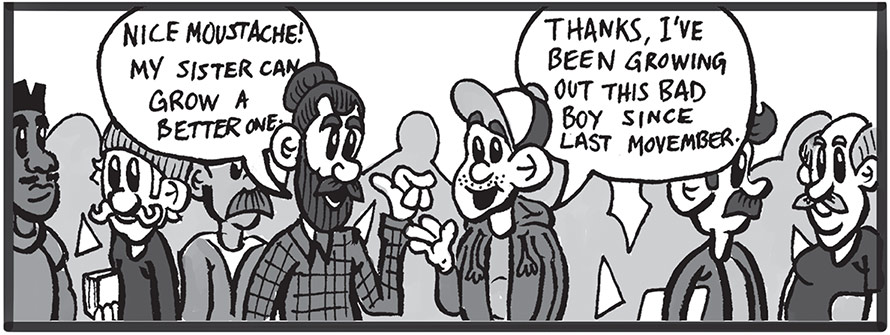Addictions and its affects on the mind and body
Nothing beats a cool beer on a hot night or relaxing joint after plugging
away on an essay for hours. However, overuse of any substance
can cause some serious problems down the road. Here are the top
fi ve drugs used by London residents under 24 years of age, and their
long-term mental and physical consequences.
Additional facts about addiction
• Approximately nine per cent of marijuana users become addicted (17 per cent of those who start young)
• Addiction increases tolerance, eventually leading to pleasure only being felt when the drug is taken
• Withdrawal symptoms are often terrible, including depression, anxiety, nausea and vomiting, sweating, headaches and intense cravings
• The percentage of drug users in Canada had not changed signifi cantly from 2004- 2012 (Health Canada)
• Young Canadians are waiting longer to begin using marijuana or alcohol, although abuse of prescription drugs at a young age has increased slightly (Health Canada)
Where to get help:
• Addiction Services of Thames Valley adstv.on.ca
• Canadian Mental Health Association cmha.ca
• Centre for Addiction and Mental Health camh.ca
• Alcoholics Anonymous aalondon.org
• Narcotics Anonymous glana.ca
• Ontario Addiction Treatment Centres oatc.ca
References:
http://adstv.on.ca.s202318.gridserver.com/wp-content/uploads/2014/11/REV-for-Website_Final-AGM-2014-Powerpoint.pdf
http://pubs.niaaa.nih.gov/publications/Hangovers/beyondHangovers.pdf
http://www.winmentalhealth.com/Marijuana_and_Depression_Schizophrenia_Suicide_Risk.php
http://www.winmentalhealth.com/marijuana.medicalmarijuana.php
http://www.painphysicianjournal.com/2008/march/2008;11;S105-S120.pdf
http://www.drugabuse.gov/publications/research-reports/cocaine/what-are-long-term-effects-cocaine-use
http://www.drugabuse.gov/publications/research-reports/methamphetamine/what-are-long-term-effects-methamphetamine-abuse
http://hc-sc.gc.ca/hc-ps/drugs-drogues/stat/_2012/summary-sommaire-eng.php
| Mental | Physical | |
| Alcohol | • May trigger depression, memory loss,
seizures, mood swings • Effects motor coordination, temperature regulation, sleep, learning ability |
• Sexual dysfunction, ulcers, heart damage,
stroke, malnutrition • Increased cancer risks: mouth, oesophagus, throat, liver, breast • Immune system weakening, leading to pneumonia, tuberculosis and other diseases |
| Marijuana | • May trigger schizophrenia, depression,
psychosis, anxiety • Effects planning, memory, focus, fl exibility, abstract thinking |
• Cough, increased phlegm production,
lung infections • Increased cancer risks (up to three times more than cigarettes) • Supressed immune system, leading to bacterial infections and tumours |
| Prescription Opioids | • Decreased libido, sexual dysfunction,
exhaustion • May trigger anxiety, depression, anorexia |
• Increase in unpleasant gasses,
constipation, intestinal pain, diarrhea,
vomiting • Supressed immune response, increasing length of diseases |
| Cocaine | • Irritability, panic attacks, paranoia,
restlessness • May trigger psychosis, hallucinations |
• Loss of appetite, malnutrition, extreme
weight loss • If snorted: loss of smell, nosebleeds, hoarseness, problems swallowing • If ingested: severe bowel gangrene (intense pain, fever, vomiting, death) • If injected: severe allergic reactions |
| Methamphetamines | • Anxiety, confusion, violence, mood swings • Psychosis, including paranoia, hallucinations, delusions, repetitive actions • Reduced motor speed, impaired learning function, memory loss |
• Severe dental problems, including tooth
decay and loss of teeth • Weight loss, skin sores |
Additional facts about addiction
• Approximately nine per cent of marijuana users become addicted (17 per cent of those who start young)
• Addiction increases tolerance, eventually leading to pleasure only being felt when the drug is taken
• Withdrawal symptoms are often terrible, including depression, anxiety, nausea and vomiting, sweating, headaches and intense cravings
• The percentage of drug users in Canada had not changed signifi cantly from 2004- 2012 (Health Canada)
• Young Canadians are waiting longer to begin using marijuana or alcohol, although abuse of prescription drugs at a young age has increased slightly (Health Canada)
Where to get help:
• Addiction Services of Thames Valley adstv.on.ca
• Canadian Mental Health Association cmha.ca
• Centre for Addiction and Mental Health camh.ca
• Alcoholics Anonymous aalondon.org
• Narcotics Anonymous glana.ca
• Ontario Addiction Treatment Centres oatc.ca
References:
http://adstv.on.ca.s202318.gridserver.com/wp-content/uploads/2014/11/REV-for-Website_Final-AGM-2014-Powerpoint.pdf
http://pubs.niaaa.nih.gov/publications/Hangovers/beyondHangovers.pdf
http://www.winmentalhealth.com/Marijuana_and_Depression_Schizophrenia_Suicide_Risk.php
http://www.winmentalhealth.com/marijuana.medicalmarijuana.php
http://www.painphysicianjournal.com/2008/march/2008;11;S105-S120.pdf
http://www.drugabuse.gov/publications/research-reports/cocaine/what-are-long-term-effects-cocaine-use
http://www.drugabuse.gov/publications/research-reports/methamphetamine/what-are-long-term-effects-methamphetamine-abuse
http://hc-sc.gc.ca/hc-ps/drugs-drogues/stat/_2012/summary-sommaire-eng.php














